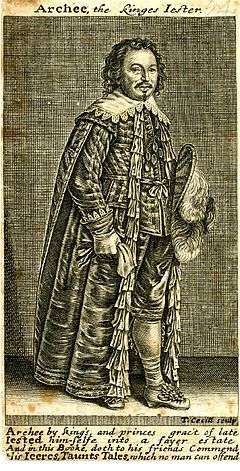Archibald Armstrong
Archibald Armstrong (died March 1672), court jester, called "Archy," was a native of Cumberland, and according to tradition first distinguished himself as a sheep thief; afterwards he entered the service of James VI, with whom he became a favourite.[1]

At court
When the king succeeded to the English throne, Archy was appointed court jester. In 1611 he was granted a pension of two shillings a day, and in 1617 he accompanied James on his visit to Scotland. His influence was considerable and he was greatly courted and flattered, but his success appears to have turned his head. He became presumptuous, insolent, and mischievous and was much disliked by the members of the court.[1] James seems to have favoured him; indeed in August 1618, Archie got the monopoly on tobacco pipes.
At the Newmarket races in 1612, he even tried to excite jealousy between James and Henry, Prince of Wales, by pointing out how more courtiers stayed with Henry once they were parted. Thereafter Henry's friends would always toss Archie in a blanket when they saw him.
Archy attended the wedding of Princess Elizabeth and Frederick V of the Palatinate in 1613. He wore a crimson velvet coat with gold lace. Another fool at court Tom Durie was painted in a red costume with gold trim.[2]
In 1623 he accompanied Prince Charles and Lord Buckingham in their royal marriage negotiations in Spain, where he was much caressed and favoured by the Spanish court and, according to his own account, was granted a pension. His conduct here became more intolerable than ever. He rallied the infanta on the defeat of the Armada and censured the conduct of the expedition to Buckingham's face. Buckingham declared he would have him hanged, to which the jester replied that "dukes had often been hanged for insolence but never fools for talking." On his return he gained some complimentary allusions from Ben Jonson by his attacks upon the Spanish marriage.[1]
He retained his post on the accession of Charles I, and accumulated a considerable fortune, including the grant by the king of 1000 acres (4 km²) in Ireland. After the death of Buckingham in 1628, whom he declared "the greatest enemy of three kings," the principal object of his dislike and rude jests was William Laud, whom he openly vilified and ridiculed.[1]
He pronounced the following grace at Whitehall in Laud's presence: "Great praise be given to God and little laud to the devil" (Laud stood only five feet tall, and bitterly resented remarks on the subject), and after the news of the rebellion in Scotland in 1637 he greeted Laud on his way to the council chamber at Whitehall with: "Who's fool now? Does not your Grace hear the news from Stirling about the liturgy?" On Laud's complaint to the council, Archy was sentenced the same day "to have his coat pulled over his head and be discharged the king's service and banished the king's court."[1]
Later years
He settled in London as a money-lender, and many complaints were made to the privy council and House of Lords of his sharp practices. In 1641 on the occasion of Laud's arrest, he enjoyed a mean revenge by publishing Archy's Dream; sometimes Jester to his Majestie, but exiled the Court by Canterburie's malice. Subsequently, he resided at Arthuret in Cumberland, according to some accounts his birthplace, where he possessed an estate, and where he died in 1672, his burial taking place on 1 April.[1]
He was twice married, his second wife being Sybilla Bell. There is no record of any legal offspring, but the baptism of a "base son" of Archibald Armstrong is entered in the parish register of 17 December 1643. A Banquet of Jests: A change of Cheare, published about 1630, a collection chiefly of dull, stale jokes, is attributed to him, and with still less reason probably A choice Banquet of Witty Jests ... Being an addition to Archee's Jests, taken out of his Closet but never published in his Lifetime (1660).[1]
References
- Chisholm 1911.
- Frederic Madden, 'Warrant for the Apparel for the Marriage of the Princess Elizabeth', Archaeologia, 26 (1836), p. 392.
Attribution:

External links
- Archy's Dream, at google books.